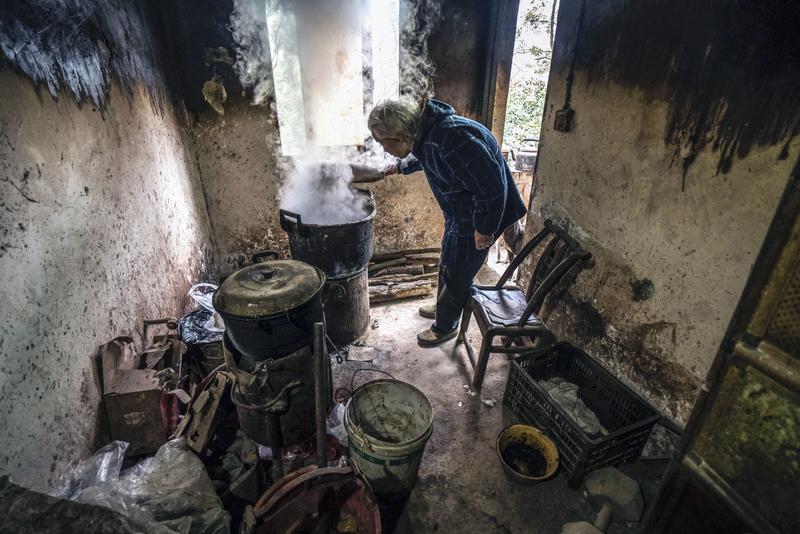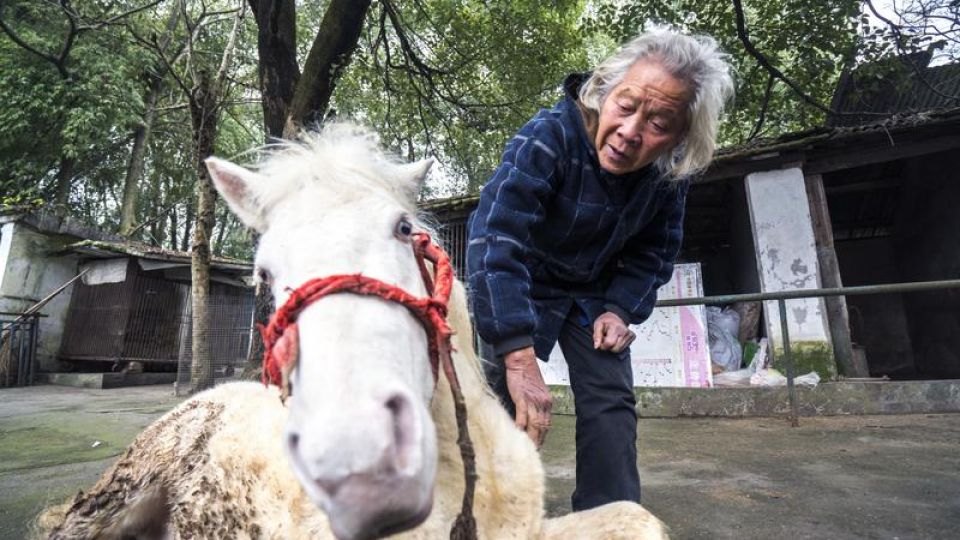May 13, 2022
BEIJING – Despite various difficulties, for 33 years, Luo Yingjiu, 82, has run a small zoo in Enshi, Hubei province, on his own.
The old design of the animals’ living quarters and the iron railings hint at the history of the zoo and its “obsoleteness”.
Many people tell me to rest at this old age, but my wish is to maintain the zoo with all my heart until my last day.
Luo Yingjiu, founder of Fenghuang Mountain Zoo in Enshi, Hubei province
At the one-man Fenghuang Mountain Zoo, Luo serves as director, cleaner, breeder, vet and conductor.
Most of the residents of the zoo are old and infirm, many of which were saved by Luo. The zoo’s lion, tiger and python passed away years ago, leaving only a bear, some peafowls, a troop of monkeys, a Tibetan mastiff, a wild boar, two raccoons and about 20 dogs.
Luo has given names to all the animals in the zoo and addresses them affectionately when he interacts with them.
A ticket only costs 10 yuan ($1.5) per person, and it’s free for children. But the zoo’s appeal to locals has long since faded. It’s not profitable, and Luo has even fallen into debt to maintain the zoo.
In recent times, due to the pandemic, the number of visitors has dwindled to just several people a day.
While the world changes rapidly, the zoo remains much the same, and so does Luo’s persistence and his love for the animals. Such an old-fashioned zoo seems incongruous, even anachronistic, in the modern age.
“Many people tell me to rest at this old age, but my wish is to maintain the zoo with all my heart until my last day. Since I’ve shouldered the responsibility, I shall never retreat from it,” says the former soldier, in the local dialect.
“I’m old in age, but young in mind. The zoo is my lifetime’s happiness.”
His long white hair has seen him mistaken for a woman, and once an elderly visitor insisted on calling him “younger sister”. Once, he cut his long hair, but one of the monkeys didn’t recognize him, so he has kept it long ever since.

Pictures show Luo buying food for and taking care of the animals at his zoo in the late 1990s. (WEN LIN / FOR CHINA DAILY)
Cinema worker to savior
After Luo retired from the army in 1978, he took a job at Qingjiang Cinema in Enshi.
Covered with thick forest, the mountainous region has rich biodiversity.
While putting up posters advertising the cinema before dawn, Luo saw people carrying large sacks to a nearby market. They were hunters from deep mountains, hoping to sell wild animals for money.
“Animals are cute. They are friends to human beings and we should love them,” Luo says. He started to buy the poor animals, such as masked civets and muntjac deer, and take them home, as well as telling whoever would listen about the importance of protecting wildlife.
Gradually, he ended up saving even more animals, which, being kept near the cinema, began to attract the attention of their own audience.
In 1986, he opened an animal exhibition on the square of the cinema, with support of the cinema’s management, drawing over 100 visitors in half a day.
In 1989, the local government invited Luo to open a zoo with his wild animals and promised that the operation model would be privately owned and subsidized by the authorities. They offered 20,000 yuan to build the zoo, and Luo, his children and the animals moved there.
“I found that locals wanted to see wild animals. Enshi was in need of a zoo, which could broaden one’s horizon. I wanted to do something for my hometown,” Luo says.

Luo clears an enclosure by hand in June 2020. (CHEN LI / FOR CHINA DAILY)
On Jan 18, 1990, People’s Daily reported the opening of Luo’s zoo and his kind deeds of saving its animals.
The annual supplement from the local government was about 2,000 yuan, but that hasn’t been in place since 1993, Luo says. In 1994, Luo applied to the authorities to seek public help, but none was forthcoming.
His retirement salary is about 5,000 yuan per month, which is sufficient to lead a decent life in a small place like Enshi.
However, to cover the zoo’s expenses, he has spent all his savings and has even fallen into debt. “It’s expensive to feed the lion, tiger and python, but I can’t let the animals starve,” he says.
He lives economically, eats simple meals and never dines out at restaurants. Sometimes he picks up empty bottles to sell to support the zoo. But he’s generous to the animals, whose daily cost of food is now about 400 yuan due to the rising prices in recent years.
Over the years, Luo has fully devoted himself to the zoo and persisted, even when, in 2006, the local government asked him to move to a more remote place during a transformation project.
He says his selflessness is something he has carried over from his army days. He joined the army in 1964 and became a member of the Communist Party of China in 1968.When he was set to retire from the army, his senior officer told him to do good deeds for the people.
“My education in the army is indelible. The most important thing for a Party member is to put collective interest before their own,” he says.

He buys food for the animals at a morning market in Enshi, Hubei province, in January 2019. (WEN LIN / FOR CHINA DAILY)
Labor of love
Living in the zoo himself, Luo gets up at about 5 am, checks the condition of the animals, cleans their enclosures and goes to the market to buy feed for them, before settling down at the gate to welcome visitors.
At night, he observes the animals and refills their food and water, and he even gets up at around 2 am to tend to the older ones.
He calls the bear Guaiguai, which means “darling” in Chinese, a common nickname for children.
It’s been about 19 years since Guaiguai came to the zoo. When Luo first saw the creature, it was missing a paw, so he purchased Guaiguai for 3,000 yuan. It’s illegal to trade bear paws in China, which were once used as ingredients in rare cuisines and in traditional Chinese medicine.
Luo pays particular attention to the bear due to her aging condition-now Guaiguai can only eat soft food.
He purchased an aging lion and tiger from a larger zoo in the hope of boosting visitor numbers to his own.
However, since 2016, when the pair finally succumbed to age, footfall to the zoo has waned, he says, because people want to see “the kings of the jungle”.
He recalls that, in the 1990s, when the zoo was in its heyday, he would welcome about 100 people a day.
“It’s not that easy to feed animals. You have to know about their different habits and characteristics. I used to observe their feces to learn about what they ate in the wildness,” he says.
He recently saved two sand badgers from a grocery market, and after one month, the duo, which used to stay away from him, seemed to be moved by his persistence, and came to greet him when he brought them food.
“You have to be patient and gentle, and you can never yell at them,” he says.
Asked which animal is his favorite, he says he treats all of his animals with equal affection, without preference for any one.
“Animals have a kind nature. They never hurt me. If they are treated well, they will also be nice in return.”

Luo prepares a meal for himself after finishing work in January 2019. (WEN LIN / FOR CHINA DAILY)
Support network
Starting from January, Luo Wei, 22, the old man’s granddaughter, began to post short videos of him looking after these animals online, hoping to raise awareness of the zoo and give people a better understanding about her grandfather’s work.
Some kindhearted people arranged the delivery of animal feed to the zoo via express courier after watching these touching videos. Luo Yingjiu is very grateful to those who’re concerned about the zoo and has expressed his gratitude in the short videos.
The account “Grandpa Luo’s Zoo “has attracted over 375,000 fans on short-video platform Bilibili, and the most popular upload has about 2 million views. Users online post on-screen comments sending blessings to Luo Yingjiu.
His son and daughter have also devoted themselves to the zoo, especially as it’s the place where they lived and grew up. They have helped their father in caring for the animals since their childhood.
His daughter used to help him at the zoo until she died in 2008 of a congenital heart illness at the age of 33.He still remembers her last words: “I can’t accompany you anymore. Please don’t let the zoo close down.”
Luo Wei says, “All my family members love animals. My grandpa always tells me to be upstanding and to contribute to society, and he’s been practicing what he preaches over the years.”
She will graduate from university this summer. She used to sit at the gate and sell tickets to the zoo when she was a kid.
“His original intention remains unchanged and he labors at the zoo all year round. My family and I hope he can enjoy a happy life in his old age, but we can’t persuade him (to give up the zoo), so we can only support him.”
Like her father, she helps her grandfather when she’s available, for example, when she returns to her hometown from school.
The cleaning is filthy and strenuous work. She recalls that her grandfather once hired someone to help, but the man was scratched by an animal. So her grandfather has continued to work on his own.
“Some animals, like the bear and the monkey, look very aggressive, but never behave like that with grandpa.”

